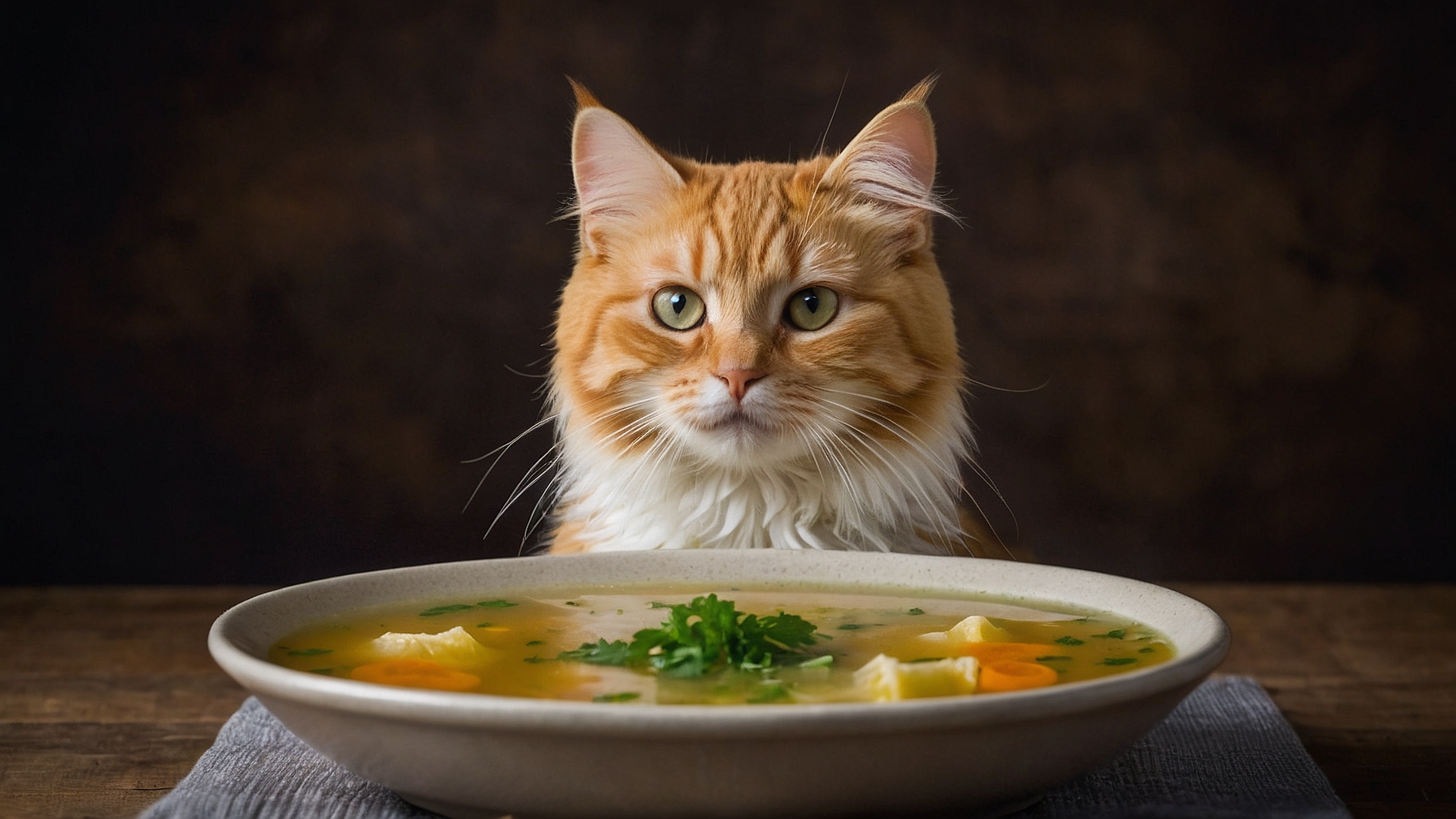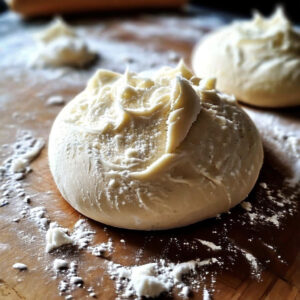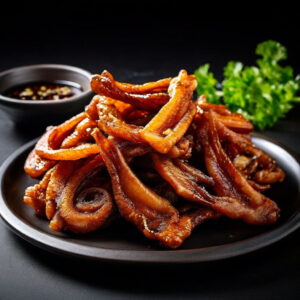Cream of chicken soup is a beloved comfort food for many people, but what about our feline friends? As cat owners, we often find ourselves wondering if it’s safe to share our favorite foods with our furry companions. While cream of chicken soup may seem like a harmless treat, it’s crucial to understand the potential risks involved before introducing it to your cat’s diet.
In this comprehensive guide, we’ll explore the question, “Can cats eat cream of chicken soup?” and provide you with the information you need to make an informed decision. We’ll delve into the ingredients of cream of chicken soup, the potential health risks it poses for cats, and the steps you should take if your feline friend accidentally consumes it. Additionally, we’ll offer healthy alternatives to ensure your cat receives a balanced and nutritious diet.
Table of Contents
What is Cream of Chicken Soup?

Cream of chicken soup is a classic comfort food that typically consists of chicken broth, cream or milk, and various vegetables such as carrots, celery, and onions. It’s a staple in many households and is often used as an ingredient in casseroles, potpies, and other dishes.
Some of the most popular brands of cream of chicken soup include:
- Campbell’s Cream of Chicken Soup
- Progresso Cream of Chicken Soup
- Pacific Foods Organic Cream of Chicken Soup
While cream of chicken soup may be delicious for humans, it’s important to understand that the ingredients used in its preparation can be problematic for our feline friends.
Can Cats Eat Cream of Chicken Soup?
In short, no, cream of chicken soup is not recommended for cats due to several potential health risks. Let’s explore some of the key reasons why this soup may not be a suitable choice for your feline companion.
Lactose Intolerance
Many cats are lactose intolerant, which means they lack the enzyme necessary to properly digest the lactose found in dairy products like cream or milk. Consuming dairy can lead to various digestive issues in lactose-intolerant cats, including:
- Vomiting
- Diarrhea
- Abdominal discomfort
- Gas
While the severity of these symptoms can vary depending on the individual cat and the amount of dairy consumed, it’s generally best to avoid feeding them foods containing significant amounts of lactose, such as cream of chicken soup.
High Fat and Sodium Content
Cream of chicken soup is typically high in fat and sodium, both of which can be problematic for cats when consumed in excessive amounts.
- High Fat Content:
- Cats are obligate carnivores and have specific nutritional requirements that differ from those of humans.
- Their natural diet consists of protein and fat from animal sources, with very little carbohydrate intake.
- Consuming large amounts of fat can lead to obesity, which increases the risk of various health issues such as diabetes, joint problems, and respiratory difficulties.
- High Sodium Content:
- Cats have a lower tolerance for sodium than humans, and excessive sodium intake can lead to dehydration, electrolyte imbalances, and potentially more severe health problems.
- The recommended daily sodium intake for cats is typically around 21 mg per pound of body weight.
While the exact fat and sodium content can vary between different brands and recipes, many cream of chicken soups contain significant amounts of both, making them an unsuitable choice for regular feline consumption.
Potential Allergens
Like humans, cats can also develop food allergies or sensitivities to certain ingredients. Cream of chicken soup often contains common allergens such as dairy, wheat, and specific vegetables like onions or garlic, which can trigger allergic reactions in sensitive cats.
Symptoms of food allergies in cats may include:
- Skin irritation or rashes
- Excessive scratching or licking
- Gastrointestinal issues (vomiting, diarrhea)
- Respiratory problems (wheezing, coughing)
If your cat has a known food allergy or sensitivity, it’s best to avoid feeding them cream of chicken soup or any other foods containing those allergens.
Risks of Feeding Cats Cream of Chicken Soup

While an occasional lick or small taste of cream of chicken soup may not cause immediate harm to most cats, regularly feeding them this soup can lead to several potential health risks.
Digestive Problems
As mentioned earlier, the high fat and dairy content in cream of chicken soup can cause digestive issues in cats, particularly those with lactose intolerance. Consuming large amounts of this soup can lead to:
- Vomiting
- Diarrhea
- Abdominal pain
- Loss of appetite
These digestive problems can not only be uncomfortable for your cat but can also lead to dehydration and other complications if left untreated.
Nutritional Deficiencies
Cats are obligate carnivores, meaning they require a diet rich in animal-based proteins, fats, and other essential nutrients. While cream of chicken soup may seem like a filling meal, it lacks the complete and balanced nutrition that cats need to thrive.
Regularly feeding your cat cream of chicken soup as a significant portion of their diet can lead to nutritional deficiencies, which can have severe consequences, including:
- Weakened immune system
- Skin and coat problems
- Vision issues
- Reproductive difficulties
- Organ damage
It’s essential to provide your cat with a diet formulated specifically for their unique nutritional needs, either through high-quality commercial cat food or carefully planned homemade meals.
Pancreatitis Risk
Pancreatitis is a potentially life-threatening condition in cats, and one of the contributing factors is a diet high in fat. Cream of chicken soup, with its substantial fat content, can increase the risk of developing pancreatitis in cats, especially if consumed regularly.
Symptoms of pancreatitis in cats may include:
- Loss of appetite
- Lethargy
- Vomiting
- Abdominal pain
- Fever
If left untreated, pancreatitis can lead to severe dehydration, organ damage, and even death. It’s crucial to seek veterinary attention immediately if you suspect your cat may be suffering from pancreatitis.
What to Do If Your Cat Ate Cream of Chicken Soup
If your cat has accidentally consumed a small amount of cream of chicken soup, there’s no need to panic. However, it’s important to monitor them closely for any potential adverse reactions or signs of digestive distress.
Here are some steps you should take if your cat has eaten cream of chicken soup:
- Observe for symptoms: Watch for signs of vomiting, diarrhea, lethargy, or any other unusual behavior.
- Limit further access: Remove any remaining cream of chicken soup from your cat’s reach to prevent them from consuming more.
- Provide plenty of fresh water: Ensure your cat has access to clean, fresh water to help flush out any potential toxins and stay hydrated.
- Consider contacting your veterinarian: If your cat exhibits any concerning symptoms or has consumed a significant amount of the soup, it’s advisable to contact your veterinarian for guidance.
Your veterinarian may recommend bringing your cat in for an examination or provide advice on managing any potential digestive issues or allergic reactions.
Healthy Cat Food Alternatives
Instead of feeding your cat cream of chicken soup or other human foods, it’s recommended to stick to a diet formulated specifically for their nutritional needs. Here are some healthy alternatives to consider:
- High-quality commercial cat food: Look for reputable brands that use high-quality ingredients and meet the nutritional requirements established by organizations like the Association of American Feed Control Officials (AAFCO).
- Homemade cat food: If you prefer a homemade approach, there are many recipes available that provide a balanced diet for cats. These typically include a combination of lean protein sources (e.g., cooked chicken, turkey, or fish), vegetables, and supplements to ensure complete nutrition.
- Cat treats: While not a complete meal replacement, you can occasionally treat your cat to small amounts of cat-safe human foods like cooked chicken, turkey, or fish (without bones or seasonings), boiled eggs, or small pieces of cooked vegetables.
It’s important to consult with your veterinarian before making significant changes to your cat’s diet or introducing new foods, as their nutritional needs can vary based on age, activity level, and overall health.
Conclusion
In conclusion, while cream of chicken soup may be a comforting and delicious choice for humans, it’s generally not recommended for cats due to the potential health risks associated with its high fat, dairy, and sodium content. Regularly feeding cream of chicken soup to your feline friend can lead to digestive issues, nutritional deficiencies, and even more severe conditions like pancreatitis.
If your cat has accidentally consumed a small amount of cream of chicken soup, monitor them closely for any adverse reactions and contact your veterinarian if necessary. However, it’s best to avoid intentionally feeding them this soup or other human foods that are not specifically formulated for their unique nutritional needs.
Instead, focus on providing your cat with a balanced and complete diet through high-quality commercial cat food or carefully planned homemade meals tailored to their specific requirements. Additionally, remember to consult with your veterinarian before introducing any new foods or making significant dietary changes, as they can provide valuable guidance based on your cat’s individual health and nutritional needs.
Reference
Here are some additional trusted resources with more information on cats and their dietary needs:
- ASPCA: People Foods to Avoid Feeding Your Pets
- Cornell Feline Health Center: Feeding Your Cat
- PetMD: Cat Nutrition: What Makes a Nutritional Cat Food?
Remember, when it comes to your cat’s diet, it’s always best to consult with a veterinary professional to ensure their specific nutritional needs are being met in a safe and healthy manner.
FAQs
Can kittens eat cream of chicken soup?
No, kittens should not be given cream of chicken soup or any other human foods as their developing bodies have specific nutritional requirements that can only be met by a specialized kitten diet.
What if my cat really seems to like the taste of cream of chicken soup?
While your cat may enjoy the taste of cream of chicken soup, it’s essential to resist the temptation to feed it to them regularly. Instead, consider providing them with small amounts of cat-safe treats or adding a bit of low-sodium chicken broth to their regular food for extra flavor and hydration.
Can cats eat chicken noodle soup?
No, chicken noodle soup is generally not recommended for cats due to the potential presence of dairy, high sodium content, and other ingredients that may be harmful to their health.
What should I do if my cat ate a significant amount of cream of chicken soup?
If your cat has consumed a large quantity of cream of chicken soup, it’s best to contact your veterinarian immediately for advice. They may recommend bringing your cat in for an examination or provide guidance on managing potential digestive issues or other complications.
Are there any human foods that are safe for cats?
While it’s best to stick to a diet formulated specifically for cats, there are some human foods that can be given in moderation as occasional treats. These include cooked lean meats (without bones or seasonings), boiled eggs, and small amounts of cooked vegetables. However, it’s always advisable to consult with your veterinarian before introducing new foods to your cat’s diet.




